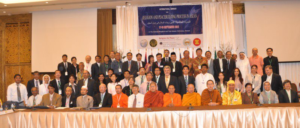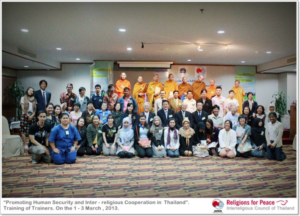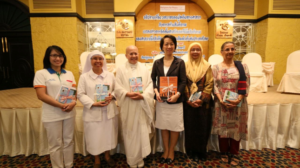
Background:
Religions for Peace Thailand (RfP Thailand) is a part of a rapidly growing global network of Religions for Peace which advances common action among the world’s religious communities for peace. It has since 2003 embarked on the mission of mobilizing religious leaders and members of religious communities to work in the area of conflict transformation and peacebuilding for Thai society.

From 2009 until present Thailand’s Southern Unrest has been marked as the key targeted area for RfP Thailand’s activities, which have largely been 1) intra and interreligious dialogues, 2) fieldtrips to learn about peaceful coexistence, 3) capacity building workshop and 4) youth camps. RfP Thailand via its Interreligious Council (IRC) also organizes religions praying and peace walks (dhammayattra) aiming at raising awareness among Thais that violent means is not a proper solution for any conflict whenever there is a tension between communities or groups of people with different backgrounds and beliefs.
Secretariat office and executive team:
Since 2009 RfP Thailand has its secretariat office set up at the Institute of Human Rights and Peace Studies (IHRP), Mahidol University and a group of academic of IHRP, consisted of Dr. Suphatmet Yunyasit (RfP Thailand’s Secretary General), Dr. Padtheera Nakurairattana, Assoc. Prof. Dr. Gothom Arya, and Ms. Kanyanat Valajang (RfP Thailand’s coordinator), has been the one who executes the tasks and activities of RfP Thailand along with cooperation and collaboration with committee of Religions for Peace-Interreligious Council of Thailand (RfP-IRC Thailand).
Vision and mission:
RfP Thailand has been guided by the vision of Religions for Peace International: “the vision of a world in which religious communities cooperate effectively for Peace, by taking concrete common action”
RfP Thailand’s mission is to advance common action and cooperation among Thailand’s religious communities for peace.


Strategic Plan:
RfP Thailand had largely observed the strategic plan of Religions for Peace International. It, however, enhances the plan, bearing in mind challenges to peace in Thai and international contexts and the need for a strong sub-national and national network of religious communities to lead efforts to advance effective multi-religious cooperation for peace and conflict transformation.
Two overarching goals are as follows:
- To build stronger multi-religious collaboration for peace and conflict transformation
- To advance human developments and to empower people living in the conflicting area
Women and Youths of Faith for Peace, RfP Thailand
Responding to the international trend on enhancing roles, participation, and engagement of women and youth in the policy decision concerning peace and security, RfP Thailand decides to increase its activities regarding these two target groups who are also key stakeholders of the violence and protracted conflict in Thailand’s three southernmost provinces. On 30 November 2014 RfP Thailand established its Women of Faith for Peace with hope to enhance capacities of women, especially those living in the three southernmost provinces, to act as conflict transformers and as a bridge between women group and other stakeholders. Since 2014 the group has carried out activities that engage the members in the conflict transformation works more actively, appropriately, and constructively.
On 30 November 2014 RfP Thailand established its Women of Faith for Peace with hope to enhance capacities of women, especially those living in the three southernmost provinces, to act as conflict transformers and as a bridge between women group and other stakeholders. Since 2014 the group has carried out activities that engage the members in the conflict transformation works more actively, appropriately, and constructively. In September 2018 there was a crucial step for RfP Thailand when it established its Youths of Faith for Peace group. RfP Thailand encourages the group to interact with some members of the women group and religious leaders in itsnetwork. Learning and sharing among the three groups will definitely create better understanding of the conflict at personal level. The next step will be to make these groups collaborate for social changes at sub-national level.
In September 2018 there was a crucial step for RfP Thailand when it established its Youths of Faith for Peace group. RfP Thailand encourages the group to interact with some members of the women group and religious leaders in itsnetwork. Learning and sharing among the three groups will definitely create better understanding of the conflict at personal level. The next step will be to make these groups collaborate for social changes at sub-national level. RfP Thailand’s core strengths:
RfP Thailand’s core strengths:
There are three core strengths of RfP Thailand that allow the organization to stand out in the area of religion in conflict transformation and peacebuilding for the South of Thailand.
The most well-known core strength of RfP Thailand lies its multi-religious identity and network. No single religious community leads RfP Thailand. RfP Thailand, with help from its Interreligious Council, possesses one of the expansive multi-religious community networks in the South.
II. Multi-religious cooperation on multiple levels
RfP Thailand primarily had worked for peace at sub-national and national level. In the South RfP Thailand’s works start to bear some fruits. Establishing multi-religious cooperation between religious communities the South and ones at national level started a few year ago with hope to build stronger cooperation and network between the stakeholders in the South with the potential conflict transformers outside the conflict zone.
III. Learning platform with variety of activities
RfP Thailand has been known as an organization creating a good learning platform for conflict transformation for middle level and grassroot actors. Apart from its intra and interreligious dialogue where by participants develop better understanding of a situation by engaging in deep listening and exchanging ideas and opinions with one another, capacity building workshop and fieldtrip within and outside the South also characterize the uniqueness of RfP Thailand.
